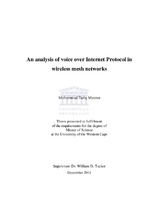An analysis of voice over internet protocol in wireless mesh networks
Abstract
This thesis presents an analysis of the impact of node mobility on the quality of service for voice over Internet Protocol in wireless mesh networks. Voice traffic was simulated on such a mesh network to analyze the following performance metrics: delay, jitter, packet loss and throughput. Wireless mesh networks present interesting characteristics such as multi-hop routing, node mobility, and variable coverage that can impact on quality of service. A reasonable deployment scenario for a small organizational network, for either urban or rural deployment, is considered with three wireless mesh network scenarios, each with 26 mesh nodes. In the first scenario, all mesh nodes are stationary. In the second scenario, 10 nodes are mobile and 16 nodes are stationary. Finally, in the third scenario, all mesh nodes are mobile. The mesh nodes are simulated to move at a walking speed of 1.3m per second. The results show that node mobility can increase packet loss, delay, and jitter. However, the results also show that wireless mesh networks can provide acceptable quality of service, providing that there is little or no background traffic generated by other applications. In particular, the results demonstrate that jitter across all scenarios remains within humanacceptable tolerances. It is therefore recommended that voice over Internet Protocol implementations on wireless mesh networks with background traffic be supported by quality of service standards; otherwise they can lead to service delivery failures. On the other hand, voice-only esh networks, even with mobile nodes, offer an attractive alternative voice over Internet Protocol platform.

